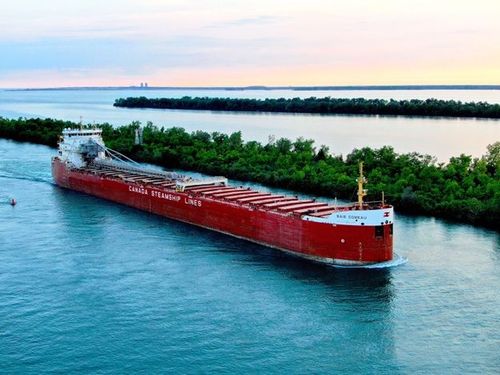CSL leads maritime industry in biofuel adoption

SOURCE: Windsor Aerial Drone Photography
December 14, 2023
BY CSL
CSL proudly announces a significant milestone in its Great Lakes biofuel program – one of the longest-running initiatives of its kind in the maritime industry.
With a cumulative 75,000 running hours on B100 biofuel over the past four years, CSL ships have made significant strides in supporting decarbonization efforts by replacing 55,000 metric tons of fossil fuel with biodiesel and avoiding 156,000 metric tons of CO2.
“Unlike other shipping companies that are just getting started with their biofuel initiatives, we have moved past the testing phase and are running biodiesel as part of our business – just one of the many ways we are reducing carbon in our operations,” said Louis Martel, CSL President and CEO.
Advertisement
“In 2023, our biofuel fleet set a new record by using 16,400 metric tons of B100 biodiesel in a single season, marking our highest consumption to date. This translates into an 80 to 90 percent reduction in greenhouse gas (GHG) emissions, leading to the avoidance of 50,000 metric tons of CO2 across our Great Lakes fleet.”
CSL initiated its biofuel journey in 2019 with a B50 blend, gradually progressing to B80 and, in 2020, running two ships on B100 – pure biodiesel produced entirely from waste plant material unrelated to food production. Since 2021, eight CSL vessels have run continuously on B100 for five to eight months per year, proving the technical viability and practicality of biofuel in reducing well-to-wake GHG emissions and meeting regulatory limits for SOx and NOx emissions.
Advertisement
“In 2024, eight of our Great Lakes ships will run on biofuel, and we hope to eventually extend the program across our entire Great Lakes fleet,” Mr. Martel announced. “Biofuel offers a practical and low-risk solution toward a decarbonized marine industry, but we need government support to ensure it remains affordable. CSL is proud to lead the way in showcasing the effectiveness of biofuel, and we call on governments and industry stakeholders to accelerate the adoption of sustainable practices in maritime transportation.”
Since 2019, CSL’s biofuel program has played a pivotal role in shaping industry standards. CSL’s data has been used by the International Maritime Organization (IMO) and Classification Societies to advance progress on biofuel use in the maritime sector and has informed organizations like the International Council on Combustion Engines (CIMAC) and Original Equipment Manufacturers (OEMs).
Click here to learn more about our decarbonization efforts.
Related Stories
The European Commission on July 18 announced its investigation into biodiesel imports from China is now complete and did not confirm the existence of fraud. The commission will take action, however, to address some systemic weaknesses it identified.
Kintetsu World Express Inc. has signed an additional agreement with Hong Kong, China-based Cathay Pacific Airways for the use of sustainable aviation fuel (SAF). The agreement expands a three-year partnership between the two companies.
Broco Energy on July 17 announced a new partnership with the Massachusetts Port Authority (Massport) to deliver and transition Massport's fuel tanks to renewable diesel across its various facilities.
Shell Aviation, Accenture, and Amex GBT on July 10 announced Avelia is in the process of evolving to an industry solution with independent data hosting and a multi-supplier model helping users access the GHG benefits of SAF.
Avia Solutions Group, the world's largest ACMI (aircraft, crew, maintenance, and insurance) provider, has partnered with DHL Express to reduce greenhouse gas emissions from its international shipments using SAF.
Upcoming Events










